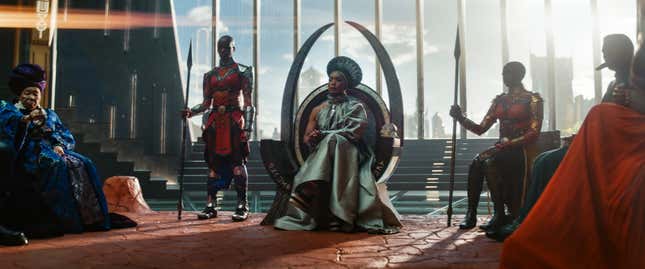
Well, hello there! Welcome back to Wakanda.
When last we left you, Killmonger “knew death was better than bondage,” Okoye and W’Kabi were in dire need of marriage counseling, and King T’Challa—played by the incomparable Chadwick Boseman—was being positioned to become the next franchise cornerstone of the Marvel Cinematic Universe.
But sadly, fate had other plans.
In August 2020, the award-winning leading man who left his indelible mark on biopics such as 42 and Get on Up; the Spike Lee joint, Da 5 Bloods; and his swan song, Ma Rainey’s Black Bottom; succumbed to colon cancer at the age of 43. And while Marvel’s rabid fanbase has taken Boseman’s unexpected loss quite hard, it’s been the Black community in particular who’ve struggled the most with our courageous king no longer with us. The same can be said for Black Panther’s resilient cast and crew, who, in the immediate aftermath of Boseman’s passing, faced the impossible task of trudging through their collective grief in order to honor his memory by pushing the record-breaking franchise forward in his absence.
Most would buckle under the weight of such high expectations, but in speaking to Lupita Nyong’o about her contributions to Black Panther’s highly-anticipated sequel, the Us star assured me that Boseman’s transition actually served as a catalyst for enlightenment.
“The loss of Chadwick diffused all the pressure because it was a real shift in how I approached life and how I approached my work,” she told me. “Going into this film, I was just meditating on how blessed I was to have an opportunity to revisit Wakanda, something that he wasn’t gonna be able to do, and something I was so sure he was gonna be a part of. So it just really sobered me [up] and left me thinking, ‘You know what? The win is getting to do it. The win is getting to make it.’”
Yes, the win is getting to make Black Panther: Wakanda Forever, a loving tribute to Boseman’s extraordinary life and legacy. But as we know all too well, oftentimes victory doesn’t come without tremendous sacrifice. And in short, Black Panther: Wakanda Forever is a film about devastating loss—and grief.
In 2018’s Black Panther, Wakanda went through more than its fair share of turmoil. But four years later, nothing can prepare even the most ardent Marvel fan for the shocking twists and turns that await them during Wakanda Forever’s ambitious two-hour and 40-minute runtime. As such, as someone who had the privilege of attending the world premiere on Oct. 26 at the Dolby Theatre here in Los Angeles, I found myself in awe of the film’s nuanced explorations of grief, as well as the multitude of ways in which it manifests. Clearly, the loss of T’Challa has left a profound impact on the kingdom of Wakanda, but it’s how Shuri (Letitia Wright) and Queen Ramonda (Angela Bassett) navigate this anguish that weaves the canvas that allows Wakanda Forever to truly thrive.
With a technological marvel to rule, and neighboring countries foaming at the mouth to plunder Wakanda for its precious Vibranium, Queen Ramonda is denied the opportunity to properly grieve the loss of her son. Instead—like the countless Black women that came before her—she pours herself into her duties, protecting her homeland without its guardian—the Black Panther—at her disposal, and with complete disregard for her own emotional well-being. On the other end of this spectrum is Shuri, who evolves from the wise-cracking engineer we all know and love into a tech-savvy sentry consumed by vengeance. This unbridled fury puts her in direct conflict with Tenoch Huerta’s Namor, who’s suffered an unspeakable loss of his own and whose arrogance and righteous indignation threaten to tear Wakanda asunder.
It’s impossible not to notice the similarities between these two characters, who are both entirely justified in their dueling quests for dominion and retribution. But what’s disheartening—and all too familiar as a Black man living in the shadow of Trump’s America—is watching POC destroy each other while their true enemy observes the carnage unscathed. That parallel to Black and brown lives is likely intentional, yet it was definitely something that still hit a little too close to home because whew.
Thankfully, characters like Dominique Thorne’s Riri Williams inject some much-needed levity—Disney+’s Ironheart can’t come soon enough—while Wakanda’s beautifully rendered skyscrapers and explosive fight choreography hit different with Dolby Atmos and Dolby Vision serving as willing accomplices. I can’t even put into words how astonished I was at the combined might of Dolby’s Atmos’ immersive sound coupled with Dolby Vision’s radiant range of colors. So if the opportunity presents itself to bask in Ryan Coogler’s latest creation with either of the above, swipe that debit card and thank me later.
In closing, while there isn’t an instruction manual on how to follow up a $1.3 billion juggernaut in the absence of its lead character—imagine The Dark Knight, Spider-Man: Far From Home, or any other superhero franchise without its main protagonist—Black Panther: Wakanda Forever provides the blueprint on how to excel in doing exactly that, thanks to a masterfully-constructed ensemble cast and an underlying theme brimming with emotion and relatability. There’s strength to be drawn from vulnerability, and Shuri’s narrative arc affords her the tools to both properly honor her brother and usher in the next era of her proud nation—ensuring that Wakanda truly is forever.

